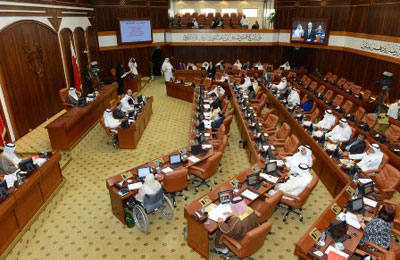
Bahraini MPs blamed for increasing debts
MANAMA, May 13, 2015
Bahrain’s MPs have been accused of adding to the kingdom’s delicate financial position by insisting on increased spending in previous years.
Finance Minister Shaikh Ahmed bin Mohammed Al Khalifa made the comment as he appeared in parliament yesterday (May 12) to discuss the national budget, said a report in the Gulf Daily News (GDN), our sister publication.
He said demands of MPs in past years had contributed to the country's increasing debt levels and dismissed criticism by current MP Ahmed Qarrata, who yesterday accused the government of blackmailing MPs by arguing that any failure to increase borrowing further would directly impact social support schemes and subsidies.
The MP also claimed Bahrain's economy was being run like a 'cold store'.
“I don't want to use the word blackmail because if we ever thought about it, we would not have been borrowing money to ensure that benefits granted to the public are not affected,' said Shaikh Ahmed.
“Bahrain is not run based on a cold store economy and the evidence is that with 90,000 oil barrels a day, we have managed to overcome the 2008 financial crisis and the 2011 political unrest, as projects went ahead and wages were paid to 50,000 civil servants without delays.
“We are not the best, we never think that, and our spending surpasses our income.
“But the solutions are tough and either we run with a conservative budget or tax people - neither of which we want to do as we have no intention to force taxes on people. We are partners, not blackmailers.”
However, he added that the subsidy system needed to be overhauled to save money.
“Subsidies are benefiting everyone while it shouldn't and subsidies for investors, companies and expatriates have to be removed at some point - this will be debated when we meet (with the National Assembly),” he said.
Negotiations on the two-year national budget between the government and the National Assembly will start today.
However, Qarrata - who had questioned the minister on reasons behind government borrowing - shouted that the government's policy was a 'failure' and warned that current borrowing plans could have serious implications for Bahrain's credit rating.
“We have presented parliament with numerous presentations and visions on how to reduce deficit over the past 12 years, but parliament just thinks about numbers, add here and remove there,” responded Shaikh Ahmed.
“Shouting failure and cold store economy is harsh because we have a realistic perception - whether in the Economic Development Board or the government.”
The new draft budget was announced by the Cabinet last week and in its current form will result in a fiscal deficit of BD1.47 billion ($3.8 billion) this year and BD1.563 billion next year.
Shortfall
That is based on planned spending of BD7.292 billion over the two years, against revenues of BD4.255 billion during the same period.
It means Bahrain must borrow to meet the BD3 billion shortfall as a direct result of lower oil prices, despite Moody's Investor Service last month downgrading the government's long-term debt rating to Baa3, maintaining a negative outlook, and warning the government's debt burden would increase to more than 70 per cent of GDP by end of 2016 - from around 46 per cent by the end of last year.
The budget accounts for a total spend of BD1.4 billion on subsidies during the two-year period.
Social Development Minister Faeqa Al Saleh told the GDN that social support schemes needed to be reined in - saying a new approach was needed that encouraged people to become self-sufficient.
“We can't continue seeing people as needy all the time and giving them payments,” she said.
“We have to come up with plans to remove them from lists and make them independent, rather than dependent.
“This why spending for this year is higher than next year, as we work on programmes and projects that will benefit the community - either by having families or individuals open businesses, get jobs or seek other sources of income.
“The current dependency is not a long-term plan that we want to continue with.” - TradeArabia News Service







